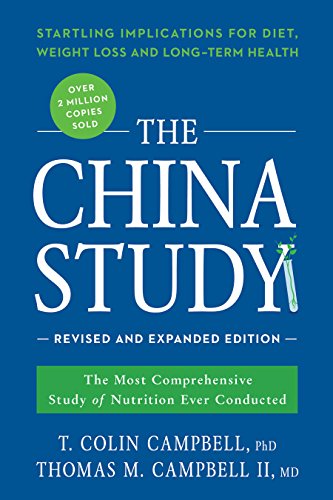

This article is an excerpt from the Shortform summary of "The China Study" by Colin Campbell. Shortform has the world's best summaries of books you should be reading.
Like this article? Sign up for a free trial here .
What are diseases of affluence? What causes them? And how can you lower your risk?
Diseases of affluence are diseases common in developed, economically prosperous areas. These are also known as diseases of “nutritional extravagance” because they’re linked to “rich” diets high in protein and fat, include coronary heart disease, cancer, and diabetes.
Learn what they are, how they develop, and how you can drastically cut your risk.
Diseases of Poverty and Diseases of Affluence
Researchers of the China Study had access to mortality rates in China for more than 40 diseases. This gave them the opportunity to study which causes of death were most common, and where.
They found that certain diseases clustered in particular parts of the country, indicating that these diseases shared a cause.
As they compared disease rates, a pattern emerged. There were two groups of diseases:
- Diseases of affluence, also known as diseases of “nutritional extravagance” because they’re linked to “rich” diets high in protein and fat, include coronary heart disease, cancer, and diabetes.
- Diseases of poverty are diseases found in poor rural or developing areas. They include parasitic disease, pneumonia, peptic ulcer, rheumatic heart disease, and pulmonary tuberculosis.
Diseases of affluence begin to displace diseases of poverty when a population accumulates wealth and consequently changes their lifestyles, diets, and sanitation systems. They start to live more like Westerners.
When researchers saw that some Chinese counties had far higher rates of “rich,” typically-Western diseases than the rest of the country, they explored the question of whether these diseases were linked to eating habits.
Diseases of Affluence and Blood Cholesterol
Researchers found that a subject’s blood cholesterol level was one of the strongest predictors of developing diseases of affluence. The lower your cholesterol, the lower your risk of heart disease and at least ten cancers, including lung, liver, colon, breast, and brain cancers.
American women, who eat a “rich” diet, die from breast cancer at a rate five times higher than women in rural China, who eat a “poor” diet. American men die from coronary heart disease at a rate 17 times higher than men in rural China.
That blood cholesterol was linked to so many Western diseases, or diseases of affluence, was surprising at the time. But what particularly shocked the researchers was how little cholesterol it took to increase your disease risk. Cholesterol levels of high-risk populations were so low that researchers initially doubted their results.
Western scientists in the 1980s believed that blood cholesterol never got below 140-150 mg/dL. They even thought cholesterol levels this low could pose health problems.
But they had determined the lower limit of blood cholesterol by examining only Western subjects. In the China Study, the average cholesterol level for adults ages 35 to 64 was 127 mg/dL. This meant the average cholesterol level in China was lower than what Western researchers thought was even possible.
For context, the American average is 215 mg/dL. We think we’re doing pretty well when our cholesterol is around 170 mg/dL. But 170 mg/dL was high for the Chinese subjects, and researchers found that those in China with blood cholesterol levels around 170 were the most likely to die of diseases of affluence.
Researchers were clearly wrong to think that with such overall low cholesterol levels in China, there would be no further association between cholesterol and Western diseases. As blood cholesterol decreased from 170 mg/dL to 90 mg/dL, coronary heart disease and cancer rates decreased. They concluded that even small amounts of cholesterol in your blood put you at risk for diseases of affluence. This was a monumental discovery as researchers have tried to understand what exactly causes diseases of affluence.
Decrease Your Risk of Diseases of Affluence
Diseases of affluence are on the rise, and a huge percentage of the world population is at risk. You can lower your risk of developing a disease of affluence by lowering your cholesterol. Eating a plant-based diet has been shown to effectively lower blood cholesterol levels.
The Advantages of Diet as Prevention and Treatment for Heart Disease
Many studies over the past 50 years have demonstrated that the U.S. has some of the highest rates of heart disease in the world, even compared with other Western countries. (Since the first publication of the book, a few Western countries have surpassed the U.S. in heart disease deaths.)
Surgery and drugs are not the only ways to treat this ubiquitous disease of affluence.
When compared with societies that eat a traditional (non-Westernized) diet, the difference is dramatic. These studies generally demonstrate that the countries whose citizens eat the least saturated fat and animal protein and the most plant foods have the lowest risk of heart disease.
If you’re a heart disease patient, there are many reasons you might try changing your diet to manage your disease before taking prescription medications or having surgery.
Benefit #1: Diet is a safer treatment than surgery or medication. There are no known detrimental effects of eating a WFPB diet.
Benefit #2: Diet is a cheaper treatment than surgery or medication. Compared to the cost of bypass surgery, which can set individuals and insurance companies back $200,000, dietary counseling costs about $900, and year-long diet and lifestyle intervention programs cost around $7,000.
———End of Preview———

Like what you just read? Read the rest of the world's best summary of "The China Study" at Shortform . Learn the book's critical concepts in 20 minutes or less .
Here's what you'll find in our full The China Study summary :
- Why animal proteins (meat, milk) might cause cancer, diabetes, and other diseases
- Why the medical institution is structured to hide the truth about disease and food
- The precise diet you'll need to eat to live longer and feel happier






